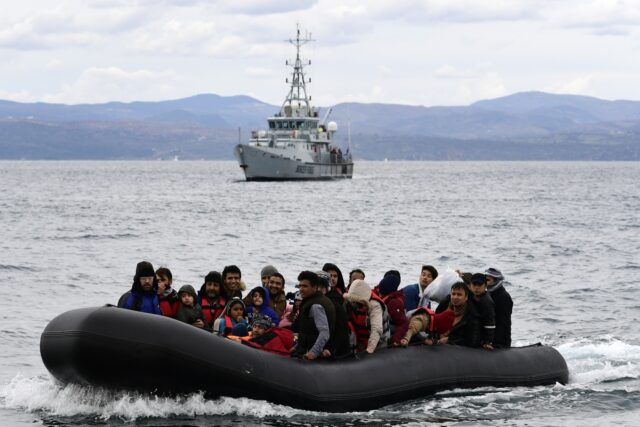A much-anticipated report by the European Union’s anti-fraud watchdog into the EU border agency has concluded that Frontex employees were involved in covering up illegal pushbacks of migrants from Greece to Turkey in violation of their “fundamental rights.”
EU report: Frontex covered up migrant pushbacks from GreeceBy RENATA BRITO and DEREK GATOPOULOSAssociated PressThe Associated PressATHENS
ATHENS (AP) — A much-anticipated report by the European Union’s anti-fraud watchdog into the EU border agency Frontex has concluded that Frontex employees were involved in covering up the illegal pushbacks of migrants from Greece to Turkey in violation of their “fundamental rights.”
The 120-page OLAF report was made public Thursday by the Germany-based freedom of information portal FragDenStaat together with media organizations Der Spiegel and Lighthouse Reports.
Top managers at Frontex committed “serious misconduct and other irregularities” in covering up pushback incidents, not investigating them or handling them correctly, the report found, but names were redacted.
“In doing so, they hindered the capacity of Frontex to fully comply with its responsibilities, namely ensuring for the protection and promotion of fundamental rights,” the report read.
Frontex coordinates search-and-rescue and border interception operations on behalf of the 27 EU countries. Pushbacks, the forcible return of people across an international border without an assessment of their rights to apply for asylum or other protection, violate both international and EU law.
OLAF investigators poured over information from open sources and media reports, sought documents from Frontex and the European Commission and interviewed 20 witnesses to investigate accusations of possible involvement or covering up of illegal pushbacks and accusations of misconduct or irregularities.
“OLAF concludes, based on the evidence collected during the investigation, that the allegations are proven,” the report read.
There was no immediate comment from Frontex or Greek authorities on the report but both have previously denied any wrongdoing.
Earlier this year Frontex Executive Director Fabrice Leggeri resigned following the OLAF report, which was concluded in February, as well as repeated media investigations that accused the agency of involvement in pushbacks.
The report details how pushback accusations — which include reports of migrants being put in liferafts and left adrift at sea — and evidence of them were mishandled, often not reported or not investigated according to Frontex’s own rules.
Frontex officers also may have failed to report alleged pushbacks due to fear of repercussions from Greece, the report said. In one case, the report said the EU border agency’s surveillance plane flew away from the scene of an alleged pushback “to avoid witnessing incidents in the Aegean Sea.”
On August 5, 2020 a member of Frontex reported his concerns in an email after a Frontex plane witnessed Greek authorities forcing a flimsy migrant boat back into Turkish waters.
“Towing an overcrowded fragile boat in the night towards the open sea is a situation that can seriously endanger the lives of the passengers,” the email said. “Our aircraft was immediately instructed to fly away from the scene by the Hellenic coast guard expert.”
EU investigators also said Frontex shared incorrect or biased information with EU institutions, including members of the European Commission and Parliament, who are responsible for holding the agency accountable, as well as OLAF investigators.
“I welcome that the OLAF report is finally public, as it should have been from the very beginning,” said Cornelia Ernst, a European lawmaker in the parliament’s Left group, who confirmed the report’s authenticity.
“It proves once again black on white what we have been saying for many years: Frontex is systematically involved in human rights violations and their coverup at the EU’s external borders,” Ernst added.
Other lawmakers were less critical.
“There was misconduct within the agency concerning three people,” said Lena Düpont, a lawmaker with the European People’s Party. “The way the agency was structured by them was not helpful, the way they dealt with the allegations was also not helpful.”
Düpont described Leggeri’s resignation as the “correct” thing to do and welcomed the structural changes taking place at Frontex to address these issues.
Greece granted Leggeri a state award in January, thanking him for helping the country lower the rate of incoming migrants. The award was presented by Greek Migration Minister Notis Mitarachi, who was mocked Thursday by a prominent Greek lawmaker.
“Now with the leak of the entire damning report, everyone can now understand what was going on and who has been covering it up,” said Kostas Arvanitis, a left-wing member of the European Parliament.
The OLAF report raises questions about how Frontex will continue operating in Greece. According to its own regulations, the agency’s leader should suspend or terminate its activity if they see “violations of fundamental rights or international protection obligations that are of a serious nature or are likely to persist.”
Last week, front-LEX, a non-governmental organization challenging EU migration policies, filed a case at the EU Court of Justice in Luxembourg seeking the immediate termination of Frontex operations in Greece based on the findings of the OLAF report.
“As long as Frontex is there, the Greek government has carte blanche to continue throwing migrants in the water to drown,” front-LEX lawyers Omer Shatz and Iftach Cohen told The Associated Press.
___
Brito reported from Rio de Janeiro, Brazil.
___
Follow all AP stories on migration at https://apnews.com/hub/migration

COMMENTS
Please let us know if you're having issues with commenting.